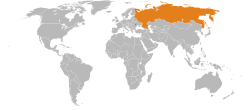Moldova–Russia relations
Moldova–Russia relations are the bilateral relations between the Republic of Moldova and the Russian Federation.
 | |
Moldova |
Russia |
|---|---|
History
Following its victory in the Russo-Turkish War 1806–1812, the Russian empire annexed Bessarabia from the Ottoman Empire. This historical region, which was originally part of the Principality of Moldavia, constitutes most of the territory of modern Moldova.
In the early 20th century, Bessarabia briefly gained independence from Russia as the Moldavian Democratic Republic. It entered a union with the Kingdom of Romania, with whom it shares the same language and ethnicity in 1918 and was ceded by Romania to the Soviet Union in 1940. This led to the establishment of the Moldavian Soviet Socialist Republic.
.svg.png) Flag of the Russian Soviet Federative Socialist Republic (1954–1991)
Flag of the Russian Soviet Federative Socialist Republic (1954–1991).svg.png) Flag of the Moldavian Soviet Socialist Republic (1952–1990)
Flag of the Moldavian Soviet Socialist Republic (1952–1990)
Moldavian SSR (renamed to SSR Moldova) then declared its independence from the USSR on August 27, 1991. A conflict between the government of Moldova and a secessionist entity on its territory escalated into a war in 1992, which was stopped by direct intervention of the Russian 14th Army and resulted in the emergence of the internationally unrecognized republic of Transnistria. After the ceasefire, two separate groups of Russian military forces remained in Moldova: a small peacekeeping regiment, which is part of the Joint Control Commission, and the 14th Army, which was tasked with guarding a large Soviet ammunition depot in Cobasna on Transnistria-controlled territory. Evacuation of this depot was eventually stalled and Russian military presence in Moldova continues to this day, against the will of the Moldovan Government.
Relations between Moldova and Russia deteriorated in November 2003 over a Russian proposal for the solution of the Transnistrian conflict, which Moldovan authorities refused to accept. In 2006, a diplomatic conflict resulted in the Russian ban of Moldovan wines, damaging the wine industry of Moldova considerably, as Russia remained the largest importer of Moldovan wines by far.

.jpeg)
In the 10 years that followed, the Moldovan parliament became dominated by pro-European parties who sought to move to country away from Russian influence and to move closer to Romania and the European Union (EU). In December 2016, Igor Dodon, the leader of the Party of Socialists of the Republic of Moldova, was elected to the presidency with a pro-Russian platform, and a promise to identify with the former Soviet Union and Eastern Bloc. Since becoming president, he has visited the Russian Federation numerous times on state and working visits, having visited the country over a dozen times by January 2019.
Transnistria
Transnistria, a de facto independent region of Moldova, is supported by Russia – although Russia has not recognised Transnistria.
State Visits
In March 2017, Prime Minister Pavel Filip ordered a ban of official visits by government officials to Russia. This ban was lifted by Prime Minister Maia Sandu in June 2019.[1]
Visits of Russian Leaders to Moldova
- President Vladimir Putin (June 2000)
- Prime Minister Vladimir Putin (November 2008)[2]
- President Dmitry Medvedev (October 2009)
Visits of Moldovan Leaders to Russia
- President Petru Lucinschi (July 2000)[3]
- President Vladimir Voronin (September 2001)[4]
- President Vladimir Voronin (June 2009)[5]
- President Igor Dodon (January 2017)[6]
- President Igor Dodon (May 2017)[7]
See also
References
- https://tass.com/politics/1068807/amp
- https://m.adevarul.ro/moldova/politica/igor-dodon-explica-conditii-vladimir-putin-putea-vizita-rmoldova-anul-2019-1_5c23df0bdf52022f75eeb90c/index.html
- http://en.kremlin.ru/events/president/news/38470
- https://jamestown.org/program/voronin-in-the-kremlin-again/https://jamestown.org/program/voronin-in-the-kremlin-again/https://jamestown.org/program/voronin-in-the-kremlin-again/https://jamestown.org/program/voronin-in-the-kremlin-again/
- https://www.rferl.org/amp/Moscow_Plays_It_Smart_In_Moldova_As_Others_Dither/1765163.html
- "Moldovan president on visit to Moscow".
- "Igor Dodon can take part in the Victory Parade in Moscow » Accent TV". a-tv.md. Retrieved 2017-06-12.

